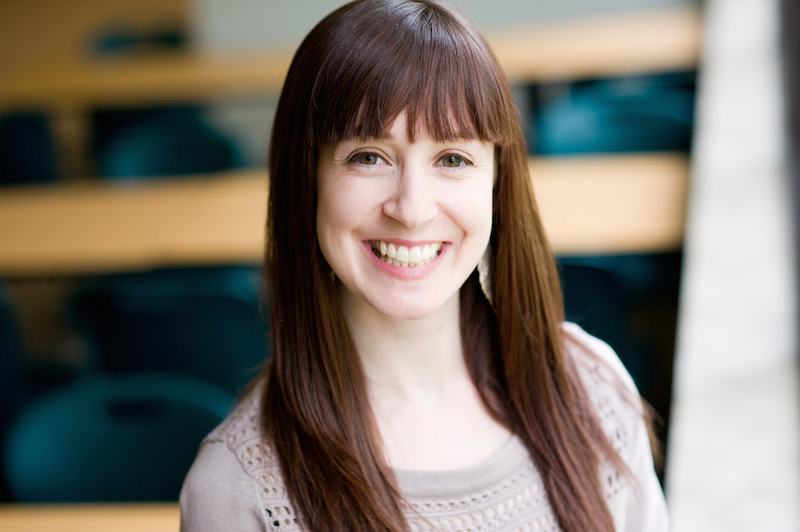
Amy Scott
Graduate student makes short list of most talented in Canada
Amy Scott, a graduate student in anthropology, has been named one of three finalists for the 2014 Impact (Talent) Award to be given by the Social Sciences and Humanities Research Council (SSHRC). The winner will be announced in Ottawa on Nov.3.
In 2012, Scott received the prestigious Vanier Canada Graduate Scholarship, given to Canada’s top doctoral students from across the country and around the world. In 2013 Scott was named a finalist in the University of Manitoba Three-Minute Thesis Competition (3MT). Her research focuses on the skeletal markers chronic stress leaves on ancient bones, which, when compared to other data, will help us pinpoint key moments in the history of human health, such as the spread of agriculture or epidemics. Her supervisor is Professor Robert Hoppa, Associate Dean (Research) in the Faculty of Arts.
“Amy Scott’s short listing for this award is evidence of the high standard of research excellence she adheres to as well as to her leadership ability in translating her research to a wider public audience,” says Digvir Jayas, Vice-President (Research and International) and Distinguished Professor at the University of Manitoba. “She is a rising research star.”
The Talent Award recognizes outstanding achievement by an individual who, at the nomination deadline, holds a Social Sciences and Humanities Research Council doctoral or postdoctoral fellowship or scholarship. It is given to an individual who maintains academic excellence, has a talent for research and knowledge mobilization and has demonstrated clear potential to be a future leader within and/or outside the academic sector.
“Amy Scott is an exceptional example of the remarkably gifted and innovative graduate students studying at the University of Manitoba,” says Jay Doering, Vice-Provost (Graduate Education) and Dean (Faculty of Graduate Studies). “We congratulate her on this prestigious achievement.”
Scott’s fellow finalists include Heather Bliss from the University of Victoria and Kirk Luther from Memorial University of Newfoundland.
Amy Scott, 3MT Final, March 6, 2013
A short biography of Amy Scott
Amy Scott is currently a doctoral candidate in the Department of Anthropology at the University of Manitoba. She completed her master’s degree at Western University and her undergraduate degree at Trent University. She is a recipient of the 2012 Vanier Canada Graduate Scholarship and the 2010-2013 Dr. Emöke J.E. Szathmáry Graduate Fellowship in Biological Anthropology. Scott also recently completed a two-year term as the Student Representative for the Canadian Association for Physical Anthropology and was a finalist in the 2013 University of Manitoba’s Three-Minute Thesis Competition. Amy’s research focus is primarily on skeletal health and biochemical indicators of stress in medieval Denmark. Through her dissertation work, Scott hopes to pioneer a new method for chemically detecting stress in archaeological remains, providing new insight into the health and well-being of past peoples. In addition to her academic work at the University of Manitoba, from 2008-2013, Scott worked with the Slavia Foundation Mortuary Archaeology Field School Program excavating a post medieval cemetery site in Drawsko, Poland.
Scott’s primary research contributions have been based upon her extensive archaeological work in Drawsko, Poland. To date, her academic contributions from this project include 14 conference presentations, eight guest lectures, and one article in press with the Cambridge Archaeological Journal. This research has also lead to her co-organization and chairing of two conference symposia entitled The Odd, the Unusual, and the Strange: Human Deviant Burials and their Cultural Contexts at the recent Canadian Association for Physical Anthropology Annual Meeting in Scarborough, Ontario (2013) and the upcoming European Association of Archaeologists Annual Meeting in Istanbul, Turkey (2014). Scott also co-organized and chaired a recent symposium at the American Anthropological Association Annual Meeting in Chicago, Illinois (2013) A Four-Field Anthropology of Fetuses which is being turned into an edited volume entitled The Fetus: Biology, Culture, and Society. Currently being considered by Berghahn Books, she will be a co-editor of this volume and contribute a chapter entitled Excavating identity: Burial context and fetal identity in post-medieval Poland.
About the Impact Awards
The annual Impact Awards recognize the highest achievements from outstanding researchers, students and research partners in social sciences and humanities research, research training, knowledge mobilization and scholarship funded partially or completely by SSHRC. Chosen from among all the excellent submissions received from eligible postsecondary institutions across Canada, these finalists have brought forward the very best ideas and research about people, behaviour, human thought, and culture—helping us to understand and improve the world around us, today and into the future.
Research at the University of Manitoba is partially supported by funding from the Government of Canada Research Support Fund.






